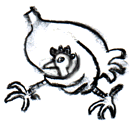Auto Assault: the multiplayer role-playing game, or, Why do cyborgs need boobs?
Shacknews - Auto Assault Preview:
 We do love this alien-race theme. Figuring out how, or whether, these storylines draw on old myths of the Titans (half earthly, half godly) would make a good research paper. Mostly these beasts are human, though, the females complete with the requisite and (one would expect) non-functional mammary glands. Why don't female cyborgs ever produce milk?
We do love this alien-race theme. Figuring out how, or whether, these storylines draw on old myths of the Titans (half earthly, half godly) would make a good research paper. Mostly these beasts are human, though, the females complete with the requisite and (one would expect) non-functional mammary glands. Why don't female cyborgs ever produce milk?
But a more important question might be: why are humans so imaginatively stunted? Why are our stories so often a repetition of stories already told? Artistic originality must be a figment of our pathetic imaginations. The market, of course, figures into this question. But let's say this story were told even if there wasn't money to be made selling it to teenaged male couch potatoes. Would it be the unique product of creative genius, an original story worthy of copyright protection and literary accolades without market analysis predetermining content, and without niche marketing predetermining audience? Is mass media producing cookie-cutter narratives, or do we just have a profound inability to think beyond fairly predictable storylines?
An excerpt from the review on shacknews.com:
Here's a male:

 We do love this alien-race theme. Figuring out how, or whether, these storylines draw on old myths of the Titans (half earthly, half godly) would make a good research paper. Mostly these beasts are human, though, the females complete with the requisite and (one would expect) non-functional mammary glands. Why don't female cyborgs ever produce milk?
We do love this alien-race theme. Figuring out how, or whether, these storylines draw on old myths of the Titans (half earthly, half godly) would make a good research paper. Mostly these beasts are human, though, the females complete with the requisite and (one would expect) non-functional mammary glands. Why don't female cyborgs ever produce milk? But a more important question might be: why are humans so imaginatively stunted? Why are our stories so often a repetition of stories already told? Artistic originality must be a figment of our pathetic imaginations. The market, of course, figures into this question. But let's say this story were told even if there wasn't money to be made selling it to teenaged male couch potatoes. Would it be the unique product of creative genius, an original story worthy of copyright protection and literary accolades without market analysis predetermining content, and without niche marketing predetermining audience? Is mass media producing cookie-cutter narratives, or do we just have a profound inability to think beyond fairly predictable storylines?
An excerpt from the review on shacknews.com:
"Auto Assault is set on a future post-apocalyptic Earth. Years ago, an alien force sent down contaminants and mindless drones to begin terraforming the planet for their own ends. Like a plague, the contaminant destroyed most that it touched, but some humans managed to survive its contact, developing various physical mutations. Seeing themselves as having been chosen to evolve to the next stage of humanity, the mutants went to war with the humans. Unable to hold their own, humanity outfitted volunteers from their number with cyborg technology, creating the half-human, half-machine Biomeks. However, the Biomeks proved incapable of dealing with the mutant army, and the humans abandoned them. They went deep underground and unleashed the world's stockpile of weapons of mass destruction in an attempt to rid the surface of mutants and Biomeks alike. Decades later, upon emergence, it turned out that both factions were able to survive that apocalypse, and unsurprisingly none were too fond of the others. Humanity sees the Biomeks and mutants as abberations, the Biomeks continues their longstanding war agains the mutants and sees humanity as betrayers, and the mutants believe that only they have the right to survive as the next step in human evolution."
Here's a male:



